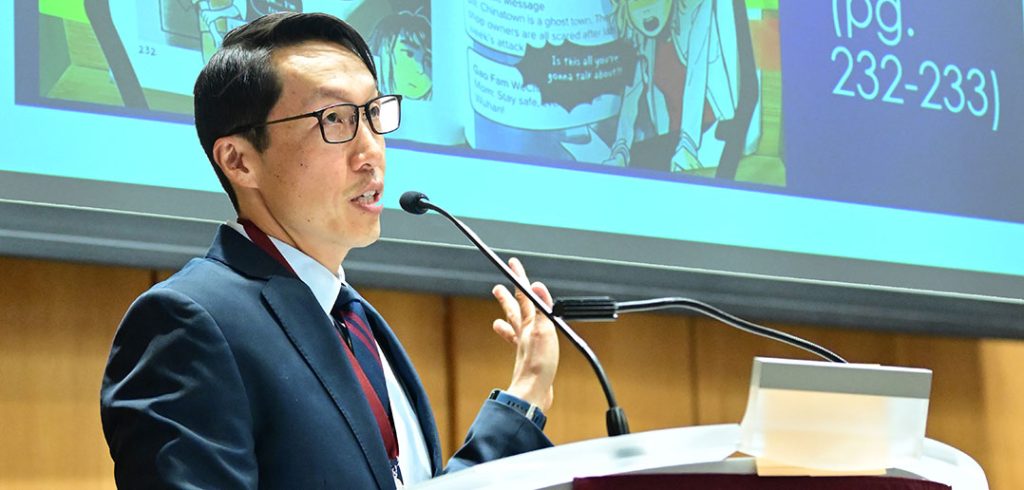The minor is part of Fordham’s new Asian American studies program, which faculty members hope to continue to expand.
“The student population is really diverse,” said Stephen Hong Sohn, Ph.D., English professor and Thomas F.X. and Theresa Mullarkey Chair in Literature. “Not only do we want Asian American students and Asian students to have a place to explore their backgrounds and identities, but it’s really important for all students to take these types of classes because they need to learn about other cultures, other identities.”
Coursework
The minor will require students to take six courses: Introduction to Asian American Studies; four electives, such as Asian American Art and Representing Asians in Journalism and Media; and one course in another race and ethnic studies area such as African & African American studies.
Students will pay particular attention to themes such as race, gender, sexuality, capital, and empire.
Faculty said the minor will help provide students with skills and knowledge they can utilize for future graduate studies as well as careers in law, education, health care, government, journalism, and more.
“Being able to give students greater vocabulary to contextualize the things that are actually going on—and the currents that are going on with Asian American populations—and to think of them with more complexity, that’s the key,” Sohn said. “It’s always about thinking more broadly, thinking more expansively, so that you’re not in a rush to make sort of surface-level judgments.”
The program involves faculty from a variety of disciplines, including literature, journalism, and history.
“No one discipline, or even set of disciplines, is really adequate to understanding Asian America as a political project, Asian America as a social relation, Asian America as an identity,” said James Kim, Ph.D., associate professor of English and comparative literature, who helped lead the efforts to launch the program. “You need all these disciplines—and the conversations that get generated between these disciplines.—in order to have any type of understanding of Asian America.”
A New York Education
Kim said that New York City will be a large part of the learning experience for students, through partnerships and experiences with local organizations, like the Museum of Chinese in America or the Asian American Writers’ Workshop.
“One thing that’s going to make us distinctive is we’re in New York,” he said. “This is home to the largest Asian American population in the continental United States, so we’ll be able to create a bunch of learning opportunities for our students.”
Kim also said that they’ll be working closely with Fordham Law School’s Center on Asian Americans and the Law.
“One of the founders [of that program]is the Hon. Denny Chin [senior judge of the U.S. Court of Appeals for the Second Circuit], and he’s very eager to collaborate with the minor, do things like guest lectures, co-teaching, maybe event programming,” Kim said.
A Better Understanding of History and Culture
Faculty members who had been developing the program said it became even more necessary in the aftermath of the COVID-19 pandemic, which increased discrimination against Asian Americans, as well as the 2021 shooting of Asian American women in Atlanta spas.
“There was a clear need on campus for spaces and conversations around Asian American identities and backgrounds,” Sohn said.
Kim said that having an Asian American Studies program is essential to helping students understand the “larger social, historical, and political forces that are producing these kinds of crises,” particularly because these types of “traumatic events change communities.”
Both Kim and Sohn said there was strong interest in and support for the program, both from current students and alumni.
“Asian American communities have been going through a pretty traumatic time for the past few years, and I would love for students to gain a sense of historical perspective that we have been here before, this has happened before,” Kim said.


